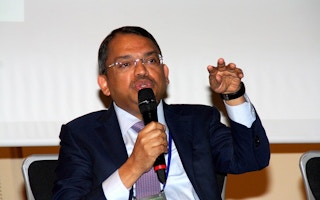Global agri-business firm Olam International has pledged to play its part in eradicating poverty and hunger, as well as in mitigating climate change impact through the implementation of private sector partnerships, said chief executive officer Sunny Verghese.
To do this, the company will adopt four of the 17 Sustainable Development Goals (SDGs) set by the United Nations.
“Based on our configuration of assets and our capabilities across the 70 countries that we operate in, we have chosen four of the SDG Goals where we believe we can create a real impact,” said Verghese at the UN’s High Level Thematic Debate on Achieving The Sustainable Development Goals in New York on Sunday.
The SDGs were adopted by the UN in September last year, setting development targets to protect the planet, and ensure prosperity for all in the next 15 years.
To help achieve these goals, the global agri-business is working to increase productivity and yield for its four million small holder farmers in its network. The company is also focusing its efforts on education on nutrition, producing fortified food products, improving water usage and irrigation efficiencies to maximize crop output.
Having co-founded Olam in 1989 before listing it on the Singapore Exchange with a current market capitalisation of S$4.8 billion, Verghese shared that he has had a 33-year career, but that he only realised that sustainability is “at the core of building an enduring business” in the last 11 years.
Speaking to the UN audience, Verghese added: “If after all of this hard work and overwhelming effort, if we are not going to be leaving a better place for our children, what is the point of it all?”
“I saw the direct link between sustainability and creating long-term value for our continuing owners. Because the average life of a company is just twelve years old. But there are also companies that are a thousand years old. You can magnify value creation if you are able to build an enduring business,” he said.
Operating from farm to shelf supplying over 47 food and agricultural raw materials to over 16,200 customers worldwide, the Singapore-listed Olam, through its team of 62,500 employees, is also building what it calls “public, private, plural, partnerships” that help to develop inclusive and sustainable growth, said Verghese.
Verghese, who was the first private sector invitee to present a keynote at the debate, noted that “this kind of partnership is central to successfully implementing the SDGs”, adding that “attitudes have changed both within the UN and across the private sector to seek actively to partner with each other in order to realise the ambitious SDG Goals by 2030.”
Verghese sees food security, water security, climate change impact, energy security, sustainable growth, growing without depleting natural resources and inclusive growth as the six major developmental challenges facing the world in this century.
“We must therefore start integrating approaches in solving them integrally as a public, private, plural society partnership,” he said.

















